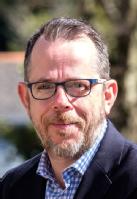WATE 2018 winner: Philip Young (Life Sciences)
What pearls of wisdom have you been given over the years that have helped you with your teaching?
My PhD supervisor (Professor Glenn Morris) told me to base my lectures on the science not fancy animation and effects. Making the slides clear (so they tell a story) is far more important than the transition between slides or the background you use. He always told me to “get the story straight before you mess around with the bells and whistles”.
Is there anything you wish someone had told you when you started out?
I wish I’d been told about imposter syndrome earlier on (the fear you aren’t good enough and will be 'found out'). When I first started everyone else seemed to know what they were doing, while I felt out of my depth - as I’ve progressed I’ve realised that almost everyone feels this way (seeing senior people struggle with doubt was a strangely liberating experience).
If you were mentoring a first-time teacher, what three bits of advice would you give?
- You don’t have to be perfect - you’ll make mistakes - do not beat yourself up (we all do it)
- You won’t get through to the whole class- some students will not engage and they will be disruptive - this has happened since the dawn of time (don’t take it personally)
- Don’t take yourself too seriously - enjoy what you are doing and your enthusiasm will get through to the students.
What advice/top tips would you give to more experienced teachers?
Listen to your students - feedback is essential. You may think you are teaching the material effectively, but what you are teaching and what the students are learning are two completely different things. Review feedback and exam answers - revisit and rework your material if common mistakes are being made.
What new technologies are you currently using to enhance your teaching? What are your top tips for using them?
When you are reviewing course material, always think about learning outcomes and assessments. I ask myself two simple questions: 1) why am I covering this; and 2) how can I assess it? I use a lot of constructive alignment (more a technique than a technology). I use mind-mapping software to build visual matrix maps of my courses (and how they link with other modules). This allows me to make sure all my learning objectives are built on previous knowledge and helps the students see how everything links. My map is hyperlinked to my question bank, which I add to throughout the year. If I review the map and spot an objective that is not associated with a question - I’ll either write one or think about why it is covered in the lectures.
What does winning a WATE award mean to you?
The award itself is obviously an honour, but it is not the important thing. We all work hard, but we rarely take a step back, pause and reflect on what we have done, what we have achieved and review where we are going. The WATE process forced me reflect on my performance and review how I am perceived by students and colleagues. The constructive feedback I received has helped me understand what I am doing well, but more importantly, also highlight where I can improve. This feedback will have more of an impact on my future approach than the award itself.
What do you enjoy the most about teaching? What’s the best part of your job?
Simply put- the students. They are bright, funny, challenging and inspiring people. We’re here for them and everything should (and does) revolve around them.
What are the biggest challenges faced by teaching staff? How do you overcome these?
The increase burden of pastoral support is a major concern. We aren’t social workers, but we are expected to provide pivotal support to vulnerable students. There is no easy fix for this - but until funding for mental wellbeing reflects the increased burden, we will all have to play an active role in student support.
If you could write a recipe for the perfect inspiring teacher, what ingredients would you need?
"The mediocre teacher tells. The good teacher explains. The superior teacher demonstrates. The great teacher inspires."
I agree with this (to a certain extent) - but there is no such thing as a perfect teacher. There is not one way to teach and there are many different but effective approaches.
I am probably not best placed to write a 'recipe' because I would not place myself in the 'great teacher' bracket. Although I have been teaching at the undergraduate level for over 15 years, there are still many things I can improve. I have done some very good things - as my nomination for WATE suggests - but we all have off days, where standards slip. So, I think the most important part is to never settle - constantly question why sessions fall below 'great' - and modify to make sure the next academic year things improve.
Enjoyed hearing from Philip? See the full list of 2018 winners and read other interviews.

